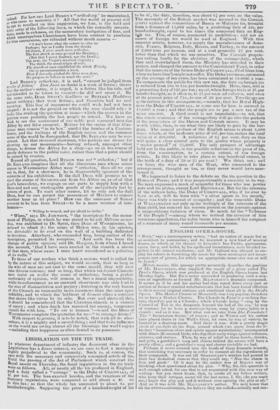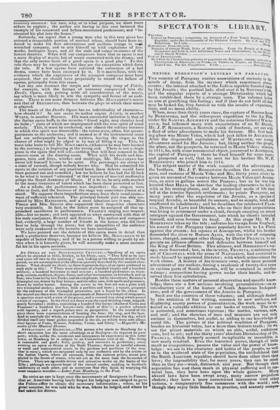ENGLISH OPERA-HOUSE.
" [licit," says a contemporary writer, "had no notion of' music but as an assistant to pantomime; and he invented a new kind of musical drains, in which, at his theatre in Lincoln's Inn Fields, pantomime, opera, farce, and ballet, by his spells and incantations, were blended to- gether in the utmost confusion; and Mr. Gahliard Was obliged to em- ploy his talents in furnishing the music for these misshapen and incon- gruous sort of pieces, for which no appropriate name ever was or will be found."
Mutat° ?zombie, this passage pretty accurately describes the position of Mr. MACFARREN, who supplied the music of a piece called The Devil's Opera, which was produced at tile English Opera-house last Monday night. But Hien never succeeded in producing such a mix- ture of ingredients as formed Mr. illacrastauN's dramatic compound. It seems as if he and his author had thus noted down every part or portion of former musical entertainments that had been found effective in their several original stations, and combined them all in the Devil's Opera. The Market Chorus in if was very popular, therefore let us have a Market Chorus. The Chorale in Faust is a striking fea- ture, therefore put in a Chorale; which Chorale being " sung by the Council of Ten in the dungeons beneath the bed of the sea," by way of contrast let us live a marriage-hymn, sung by young ladies in is church : and so it was. But what can we take from Der Friesehutz The " Incantation Scene," of course ; and as WElint and his author have placed theirs in the Wolf's Glen, let ours, by way of variety, be located in a drawing-room. And there it was : with a pretty magic circle of gas-light on the floor, around which (we quote from the li- bretto) "numerous elves and spirits appear mysteriously,"accompanied with slivers ill-omened birds, who flap their sooty wings against columns, pictures, and statues. Then, by way of relief to these howls, shrieks, and yells, a gondolier's song and chorus behind the scenes will have a pretty effect ; and a gondolier's song and chorus invisible we had. Perhaps it never entered into the heads of these dramatic wizards, that something was necessary in order to connect all the ingredients of their compound. It was not till SHAKSPEARE'S witches bad poured in their last diabolical cement that they could say, "Now the charm is firm and good." Or it may be the author was of Bayes's way of thinking, when questioned about his plot. " Why, Sir, this question is well enough asked, for one that is not acquainted with this new way of writing : but you must know, that, to outdo all my fellow writers, who keep their intrigue secret till the last scene, I, Sir, (do you mark me,) begin the play and end it without ever opening the plot at all." And so it was with Mr. MACEARREN'S author. We only know that all the events—situations, we believe they are called—actually and sue-
cessively occurred : but how, why, or to what purpose, we Must leave others to explain ; the author not having in this case imitated the example of his renowned and before-mentioned predecessor, and "in- sinuated his plot into the boxes."
Seriously, we regret that a young man who in this very piece has evinced a respectable portion of musical talent, should have been in. duced to make his first adventurous and perilous voyage in swab wretched company, and to mix himself up with explosions of fire- works, harlequin leaps, and all the stale and vulgar resources of the lowest theatres. When will our composers learn that an opera is not a mere display of music, but of music connected with the drama; and that the only secure basis of a good opera is a good play ? To this rule there may be exceptions, but they are the exceptions which form the rule. If a few operas have survived the connexion of a bad drama, scores have been swamped by it. It is marvellous, with the evidence which the experience of the youngest composer must have acquired, that we should have perpetually to record the failure of operas, principally from this cause. Let any one contrast the simple and interesting story of Fidelio, for example, with the farrago of nonsense compressed into the Devil's Opera, and, putting aside all consideration of the music, say which is most likely to win the sympathy and favour of an audi- ence. There is not more distance between Mr. MACFARREN'S music and that of BEETHOVEN, than between the plays to which their music is adapted. The music of the Devil's Opera has no individuality of character— how should it? In one scene its author copies AUBER, in another WEBER, in another ROSSINI. His most successful imitation is that of the Italian opera buffs in the terzetto " Good night, may slumber lend its balm ; " parts of which are impregnated with the true spirit of vocal melody. This, it must be confessed, was almost the solitary instance in which this spirit was discernible : the voices were, often, but accom- paniments to the orchestra; and it seemed as if the instrumental score had not unfrequently been first written, leaving the singer to the chance of what might be edged in by way of filling it up. This, we must take leave to tell Mr. AlACEARREN, (whatever he may have learned to the contrary,) is beginning at the wrong end. There is not a single piece in the opera that will sell—nothing that will bear removal to the concert-room or the drawing-room. What with his devils and dun- geons, fairs and fetes, witches and weddings, Mr. MACFARREN has never left himself leisure to be quiet. His personages are always in a state of turmoil, though nobody knows why. Had he submitted his opera to the revision of any practised hand, these defects would have been pointed out and remedied ; but we believe he has bad the ill-luck to be what is termed " educated " at that nursery of musical mediocrity yclept the Royal Academy of Music. If it be so, he only adds another to the many instances of talent which has been there perverted or lost. As a whole, the performance was imperfect : the singers were often at fault, and the business of the stage was sometimes almost at a stand. We suppose these imperfections arose from their usual cause— want of sufficient rehearsal. The principal female part was ably sus- tained by Miss RAINEORTII, and a most laborious one it was. Miss POOLII and Mrs. SEGUIN also supported their respective characters very creditably. In fact, to the ladies must be assigned all that rep. proached excellence in performance. FRASER'S singing was respect- able—but no more; and only appeared so when contrasted with that of his male coadjutors, BURNET and SEGUIN. The author and composer had, evidently, a large number of friends in the house, who did their best to help through the piece; but the sympathies of the audience were only awakened in the terzetto we have mentioned. We have pointed out the defects of this opera more in detail than such a production deserves, because we believe Mr. MACFARICEN to be
capable of better things; and if he is a person willing to profit by ad. vice when it is honestly given, he will assuredly make a more success- ful hit in his opera seconda.



























 Previous page
Previous page